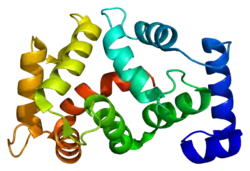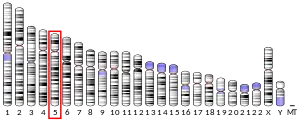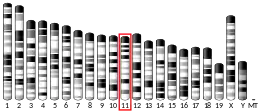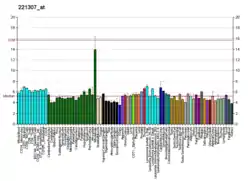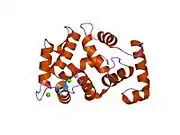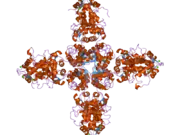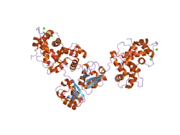KCNIP1
Kv channel-interacting protein 1 also known as KChIP1 is a protein that in humans is encoded by the KCNIP1 gene.[5][6]
Function
This gene encodes a member of the family of voltage-gated potassium (Kv) channel-interacting proteins (KCNIPs, also frequently called "KChIP"), which belong to the recoverin branch of the EF-hand superfamily.[7] Members of the KCNIP family are small calcium binding proteins. They all have EF-hand-like domains, and differ from each other in the N-terminus. They are integral subunit components of native Kv4 channel complexes. They may regulate A-type currents, and hence neuronal excitability, in response to changes in intracellular calcium. Alternative splicing results in multiple transcript variant encoding different isoforms.[6]
See also
References
- GRCh38: Ensembl release 89: ENSG00000182132 - Ensembl, May 2017
- GRCm38: Ensembl release 89: ENSMUSG00000053519 - Ensembl, May 2017
- "Human PubMed Reference:". National Center for Biotechnology Information, U.S. National Library of Medicine.
- "Mouse PubMed Reference:". National Center for Biotechnology Information, U.S. National Library of Medicine.
- An WF, Bowlby MR, Betty M, Cao J, Ling HP, Mendoza G, Hinson JW, Mattsson KI, Strassle BW, Trimmer JS, Rhodes KJ (Feb 2000). "Modulation of A-type potassium channels by a family of calcium sensors". Nature. 403 (6769): 553–556. Bibcode:2000Natur.403..553A. doi:10.1038/35000592. PMID 10676964. S2CID 4419472.
- "Entrez Gene: KCNIP1 Kv channel interacting protein 1".
- Burgoyne RD (2007). "Neuronal calcium sensor proteins: generating diversity in neuronal Ca2+ signalling". Nat. Rev. Neurosci. 8 (3): 182–193. doi:10.1038/nrn2093. PMC 1887812. PMID 17311005.
Further reading
- Bähring R, Dannenberg J, Peters HC, et al. (2001). "Conserved Kv4 N-terminal domain critical for effects of Kv channel-interacting protein 2.2 on channel expression and gating". J. Biol. Chem. 276 (26): 23888–23894. doi:10.1074/jbc.M101320200. PMID 11287421.
- Nakamura TY, Nandi S, Pountney DJ, et al. (2001). "Different effects of the Ca(2+)-binding protein, KChIP1, on two Kv4 subfamily members, Kv4.1 and Kv4.2". FEBS Lett. 499 (3): 205–209. doi:10.1016/S0014-5793(01)02560-1. PMID 11423117. S2CID 23908034.
- Kutsenko AS, Gizatullin RZ, Al-Amin AN, et al. (2002). "NotI flanking sequences: a tool for gene discovery and verification of the human genome". Nucleic Acids Res. 30 (14): 3163–3170. doi:10.1093/nar/gkf428. PMC 135748. PMID 12136098.
- Strausberg RL, Feingold EA, Grouse LH, et al. (2003). "Generation and initial analysis of more than 15,000 full-length human and mouse cDNA sequences". Proc. Natl. Acad. Sci. U.S.A. 99 (26): 16899–16903. Bibcode:2002PNAS...9916899M. doi:10.1073/pnas.242603899. PMC 139241. PMID 12477932.
- Shibata R, Misonou H, Campomanes CR, et al. (2003). "A fundamental role for KChIPs in determining the molecular properties and trafficking of Kv4.2 potassium channels". J. Biol. Chem. 278 (38): 36445–36454. doi:10.1074/jbc.M306142200. PMID 12829703.
- Van Hoorick D, Raes A, Keysers W, et al. (2004). "Differential modulation of Kv4 kinetics by KCHIP1 splice variants". Mol. Cell. Neurosci. 24 (2): 357–366. doi:10.1016/S1044-7431(03)00174-X. PMID 14572458. S2CID 40647616.
- Scannevin RH, Wang K, Jow F, et al. (2004). "Two N-terminal domains of Kv4 K(+) channels regulate binding to and modulation by KChIP1". Neuron. 41 (4): 587–598. doi:10.1016/S0896-6273(04)00049-2. PMID 14980207. S2CID 17380435.
- Lin YL, Lin SR, Wu TT, Chang LS (2004). "Evidence showing an intermolecular interaction between KChIP proteins and Taiwan cobra cardiotoxins". Biochem. Biophys. Res. Commun. 319 (3): 720–724. doi:10.1016/j.bbrc.2004.05.064. PMID 15184042.
- Lin YL, Chen CY, Cheng CP, Chang LS (2004). "Protein-protein interactions of KChIP proteins and Kv4.2". Biochem. Biophys. Res. Commun. 321 (3): 606–610. doi:10.1016/j.bbrc.2004.07.006. PMID 15358149.
- Gerhard DS, Wagner L, Feingold EA, et al. (2004). "The status, quality, and expansion of the NIH full-length cDNA project: the Mammalian Gene Collection (MGC)". Genome Res. 14 (10B): 2121–2127. doi:10.1101/gr.2596504. PMC 528928. PMID 15489334.
- Pruunsild P, Timmusk T (2005). "Structure, alternative splicing, and expression of the human and mouse KCNIP gene family". Genomics. 86 (5): 581–593. doi:10.1016/j.ygeno.2005.07.001. PMID 16112838.
- Pioletti M, Findeisen F, Hura GL, Minor DL (2007). "Three-dimensional structure of the KChIP1-Kv4.3 T1 complex reveals a cross-shaped octamer". Nat. Struct. Mol. Biol. 13 (11): 987–995. doi:10.1038/nsmb1164. PMC 3018330. PMID 17057713.CS1 maint: multiple names: authors list (link)
- Hasdemir B, Fitzgerald DJ, Prior IA, Tepikin AV, Burgoyne RD (2005). "Traffic of Kv4 K+ channels mediated by KChIP1 is via a novel post-ER vesicular pathway". J. Cell Biol. 171 (3): 459–469. doi:10.1083/jcb.200506005. PMC 2171252. PMID 16260497.
- Venn N, Haynes LP, Burgoyne RD (2008). "Specific effects of KChIP3/calsenilin/DREAM but not KChIPs1, 2 and 4 on calcium signalling and regulated secretion in PC12 cells". Biochem. J. 413 (1): 71–80. doi:10.1042/BJ20080441. PMC 2474559. PMID 18393943.
External links
- KCNIP1+protein,+human at the US National Library of Medicine Medical Subject Headings (MeSH)
This article incorporates text from the United States National Library of Medicine, which is in the public domain.
